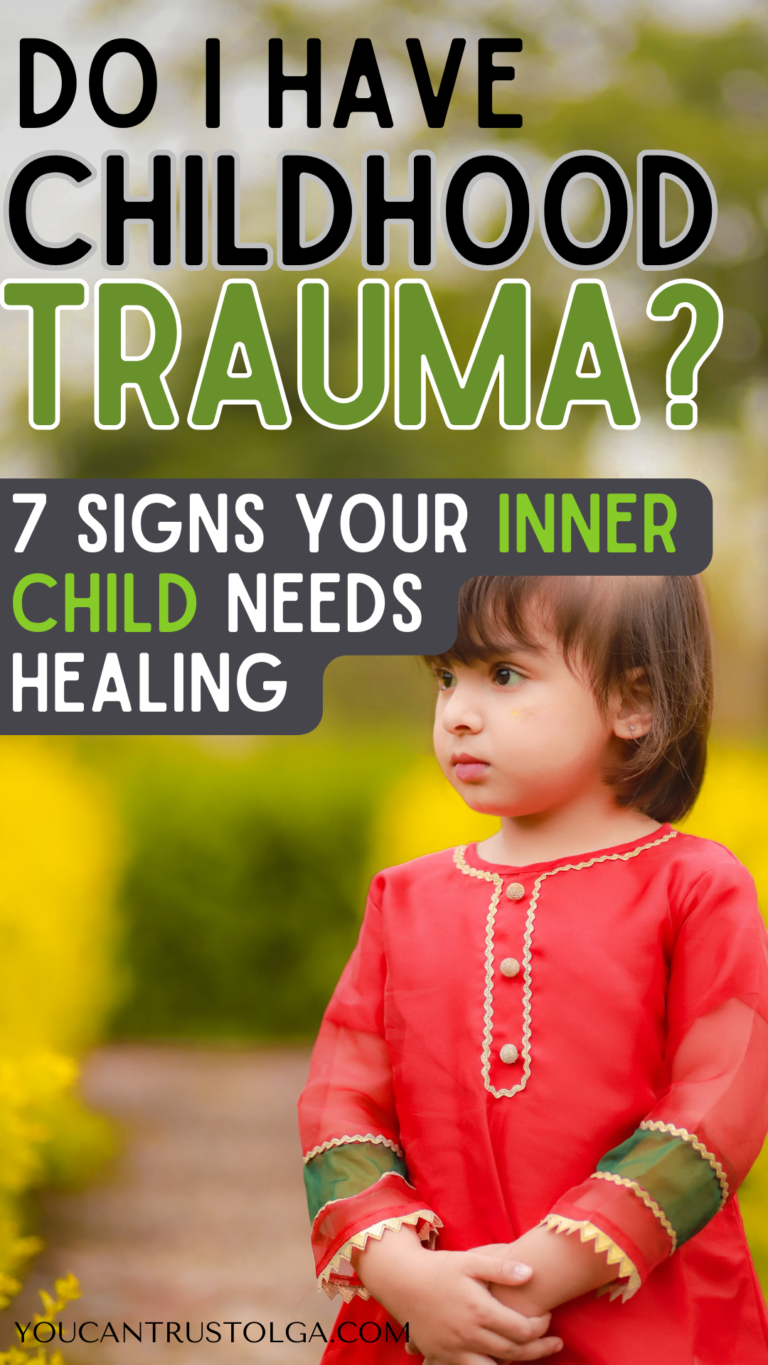Childhood experiences shape us in ways we may not even realize. It is my personal belief that almost no one can escape untouched from the early formative years. Our childhood psyche is fragile, and any experience, positive or negative, can leave a mark and influence our adult life.
Even if you recall a happy childhood, there are still moments where your immature consciousness might have misinterpreted something.

I think it is crucial to let our caregivers off the hook and understand something very important.
Most of the time, it’s not the event itself that traumatizes us, but rather our skewed interpretation of it.
Imagine this: at the tender age of 3, you took a fall. In that moment of distress, your caring mother, with the purest intentions, offered you a chocolate candy to ease your tears. At this moment, your young and impressionable mind would draw a connection: whenever I experience physical discomfort, indulging in something sweet can provide comfort.
And just like that, emotional eating becomes a part of your lives. Now as an adult, it puzzles you why each time you feel cranky, tired, or emotionally drained, you reach for the food.
However, it’s important to notice that while it only takes one small moment to leave a significant impact, NOT EVERY CHILD WILL RESPOND TO A GIVEN SCENARIO IN THE SAME WAY.
Besides the environment, there’s a mix of factors at play, including genetics. Each person has a unique disposition that affects how they react to different situations; some are just naturally more resilient than others.
That’s why it’s not unusual for someone to bounce back easily from a highly stressful event while another is shaken by a seemingly innocent situation.
Now that you are a grown-up, it is natural for you to wonder how your childhood experiences have shaped your views of the world and your place in it. I assume you wonder if there are any inner child traumas for you to heal.
To answer this question, let me first notice that it is THE DEGREE of trauma that defines the quality of your adult life.
It can just echo here and there, being a minor hindrance to your life. Or it can be so severe that it manifests itself as destructive patterns and even causes mental health issues.
Which one is your case?
Let’s see if you can recognize these patterns and their impact on your life.
1. You have a fear of abandonment
One of the most common signs that your inner child is traumatized is that you experience the fear of being abandoned. This fear often shows up in codependent relationships, where you cling to others desperately to feel safe and secure.
As a result of struggling with forming healthy connections, you can find yourself caught in toxic or even abusive relationships.
It is also not uncommon to self-sabotage the opportunity to build healthy connections. Because you are afraid to be vulnerable and potentially get hurt, you can reject a person and miss the opportunity to form a healthy attachment.
The underlying and deeply rooted belief that leads to this fear of being left alone is “I am not worthy of love.” Meaning intrinsically you don’t believe someone can love and accept you just the way you are.
SPECIFIC SCENARIO
Your partner doesn’t answer the text message in the usual manner. You start worrying that they might be losing interest in you or potentially cheating on you. Your mind gets in a panic mode and now you feel you need to do something to either win them back or dump them altogether before they reject you first. You go from one extreme to another debating between buying new lingerie or pretending you’re not interested when they finally reach out.
2. You have a problem with personal boundaries
I am sure that many of us were overly scolded in childhood for expressing ourselves too spontaneously or too openly, especially in our feelings and thoughts. Let’s face it, most adults simply don’t have the patience for kids expressing their opinions or don’t know how to handle children being emotional.
When we consistently experience such a sense of control being imposed upon us, we form a false perception that this is something NORMAL AND EXPECTED.
Breaking free from this mindset becomes exceedingly challenging in adult life, so it is only expected that we ignore our own needs and don’t know our real feelings.
We might find it difficult to say no, and instead say yes to things that we don’t want to do.
We allow others to treat us poorly because we fear confrontation or rejection.
We can be easily taken advantage of while silently remaining resentful, harvesting negative feelings towards ourselves and others.
"The Body Keeps The Score"
by B. Kolk
This book is a pure gold when it comes to trauma healing. It dives deep into how trauma doesn’t just live in our memories—it lives in our bodies. It explains how things like anxiety, chronic pain, and emotional numbness often trace back to unresolved trauma, and offers powerful insights into healing through body-centered approaches like yoga, mindfulness, and somatic therapy. A must-read for anyone on a healing journey.
This pattern of behavior can stem from a lack of self-awareness and confidence. Because as children, we were taught to be agreeable, obedient, and polite, we “successfully” suppressed who we really are and turned into either rebels or people pleasers (depending on the strategy we adopt).
That being said, inadequate personal boundaries can occupy two extremes – they can be either too weak or too rigid. Thus, in adulthood, they manifest in choosing ONE OF TWO BEHAVIORAL STRATEGIES: you either do not know how to defend your boundaries or you build walls between yourself and others.
SPECIFIC SCENARIO
You allow your acquaintances to stay over at your house while they are visiting the town. In the meantime, every fiber of your being forbids it. You agree to host them, but your essence is filled with resentment, and in your mind, you play out various scenarios where a “vicious version” of you kicks them out. The internal struggle is real.
The other side of the spectrum
You are in line at the Starbucks and someone is budging in front of you. You instantly lose your composure, and as your frustration bubbles up, it is absolutely impossible that you would keep it quiet. In a matter of seconds, it becomes such a big deal for you, that you lose the sense of reality and terribly overreact.
3. You feel shame for your emotions
Shame is an emotion that is so toxic that it can hold us back from being our true selves. We are told “Shame on you” or “You should be ashamed of yourself” almost as soon as we can understand what those words mean.
Shame is a very interesting emotion to contemplate – really, what does it mean “to be ashamed”?
If you really dig, you will see that shame is nothing but a constant internal battle between WHO WE ARE and WHO WE THINK WE SHOULD BE.
What’s even worse is when we experience shame as a SECONDARY EMOTION. Many of us are raised with the mentality that expressing emotions, especially negative ones, is something to be ashamed of.
Additionally, this message is confirmed by society, which fosters a positive mindset trend, where emotions like sadness and anger are seen as weak or unacceptable.
Shame is a very harmful emotion because it is directed at ourselves. We often either suppress it or let it consume us, neither of which is beneficial for our mental well-being.
Suppressing shame can lead to feelings of low self-worth and self-doubt while letting it consume us can manifest in destructive behaviors such as addiction or open hostility toward others.
"Worry For Nothing":
Guided Anxiety Journal
Therapy notebook that has 60 worksheets and is based on Cognitive Behavioral Therapy (CBT) techniques. It is best for trauma healing, anxiety, and working through panic attacks and depression. Amazing tool for attending your inner child needs and targeting your childhood traumas.
SPECIFIC SCENARIO
You’ve just submitted your application to the college of your dreams, eagerly anticipating the acceptance letter. But alas, a rejection arrives instead. Right away the simple fact of not being selected turns into an overwhelming sense of embarrassment, as if the rejection itself has magnified into something much larger. Instead of considering alternate plans and taking practical steps forward, you find yourself completely derailed, dreading the moment you’ll have to share this “embarrassing news” with your loved ones. It becomes an epic failure in your mind, a confirmation of your inadequacy, and you can’t help but feel a deep sense of shame for ever having dared to apply to this particular college.
4. You have addictions
Heavy dependency or addiction is almost always a sign of unresolved trauma. It means that instead of facing our emotions head-on, we strive to avoid pain and suppress our feelings, no matter the cost.
Let’s be real, discomfort in life, whether it’s emotional or physical, is inevitable. It’s a big part of being human.
Lately, I’ve noticed that our willingness to tolerate any type of discomfort has become merely non-existent. We are no longer willing to put up with any kind of pain – physical or emotional. Why would we if we can quickly reach for medicine, whether it’s for our body or our soul?
Since very few of us developed solid coping skills during our upbringing, the situation gets exacerbated even further – even the smallest delays or discomforts make us fidget and immediately seek refuge in our phones.
If you find yourself being heavily dependent on binge-watching TV shows, constantly scrolling through social media feeds, excessively consuming food or alcohol, or deliberately working long hours, that might be a clear sign that numbing your emotions instead of facing them is the coping skill you brought from your childhood to the adult life.
SPECIFIC SCENARIO
You find yourself at an unfamiliar event, surrounded by strangers. As you step into the room, a wave of anxiety washes over you. You feel out of place, unsure of where to go or whom to approach. Overthinking takes hold, and you become convinced that all eyes are on you, whispering and perhaps even judging. Unable to bear these unpleasant emotions, you make your way to the bar to grab a drink. You know that a portion of alcohol will eventually bring relief, allowing you to feel more at ease and behave in a more natural manner.
5. You are prone to anxiety
As I mentioned earlier, the childhood psyche during the formative years can be quite unstable. When we’re little, we’re still learning how to navigate and behave in this world. It’s a time of first experiences, drawing conclusions, and forming strategies for future behavior.
When a child consistently receives CONFLICTING SIGNALS from the adults around them (which, by the way, happens quite commonly), it can lead to confusion and uncertainty.
For example, if a child is told to be quiet and well-behaved, yet the adults around them are constantly loud and disruptive, it can create an internal conflict within the child.
This exposure to mixed messages creates the perfect breeding ground for anxiety, as the child struggles to make sense of the contradictory information they’re receiving. Later, this can manifest in various ways, such as fear of failure, tendency to overthink, or constant search for reassurance and validation from others.
However, I must say that some anxiety is what we consider “normal”. So-called existential anxiety is a part of the human experience and can even be beneficial in some situations, as it pushes us to take action and make changes.
In the end, it’s not about living life completely anxiety-free, but rather turning down its volume to the lowest levels possible, so it doesn’t mess with the quality of your life.
SPECIFIC SCENARIO
You saw on the local news that a bridge collapsed in a nearby town. Your mind immediately starts going wild, questioning the safety of other bridges in the neighborhood. Now, you can’t stop thinking about it and worry about the same thing happening to you or your family. The lingering anxiety stays with you for days. Every time you drive under a bridge, you fear it might just come crashing down on you. In the end, you even start avoiding driving under bridges altogether.
6. You have trouble with trust
Trust is a tricky thing.
I once discussed with my close friend Eddie a movie. It was about a group of people surviving an airplane crash in the Andes. After months abandoned in the middle of nowhere, the survivors almost lost hope. The two men from the group made a serious decision to hike through the mountains on foot in the hope of finding help. I remember admiring the courage and perseverance of one of these guys. I was thinking that if I had to take such a voyage and my partner was Eddie, I would dare to do so because of my trust in him. But then I thought: “It is good that I can have such faith in another human being, but what would be even better is if I could have the same trust in myself and be my own Eddie.”
But in real life, for many people, any form of trust is nearly impossible. Most of us struggle to believe in the honesty, integrity, and sound judgment of others. What is worse is that we may even be skeptical about trusting ourselves.
So often we stumble when we have to delegate work responsibilities or make important life decisions. We question our abilities and constantly seek validation from others, but at the same time, we remain unable to fully trust their opinions and advice.
This kind of mindset often stems from negative childhood experiences – feeling devalued and abandoned by those we trusted the most. It’s no surprise that people with trust issues might struggle in relationships, avoiding commitment and even close friendships.
Forgiveness can be tough, too, especially when it comes to trusting someone who has hurt us in the past. If any of this sounds familiar, it might be time to heal your inner child and give her or him a little reassurance.
SPECIFIC SCENARIOS
Trusting others
You’re about to go skydiving for the first time. It’s something you’ve always wanted to do. Now, you’re all geared up and ready to go, but suddenly you start getting a bit nervous. You glance over at the instructor who will be jumping with you, trying to gauge his level of expertise. You start imagining worst-case scenarios, thinking maybe he won’t do his job properly and it’ll be a total disaster. You go ahead and double-check all the hooks and belts, bombarding him with a million questions about the procedure and safety.
Trusting yourself
You’re in a meeting with your boss and coworkers, discussing an important project. You have an idea that you believe could greatly benefit the team, but you hesitate to share it. You start questioning yourself – What if they think it’s stupid? What if it gets shot down? Can I really trust my own judgment?
7. You avoid conflicts
I’m sure you know a person or two in your circle who are known for their incredibly forgiving kindness, extraordinary patience, and outward peacefulness. It’s unimaginable to witness them arguing or raising their voices; they smooth out all the rough edges and avoid even the slightest confrontation.
On the surface, it may seem as though they were just born with such a sweet, sensitive disposition, and the only motivation they have in their hearts is sincere worry about hurting someone’s feelings.
So, does that mean these people don’t feel negative emotions? Or is it more like they just DON’T LET THEMSELVES FEEL them, labeling emotions like anger, jealousy, or resentment as unacceptable? I’m more inclined to believe the latter because I know for a fact that these “kind-hearted” folks deceive themselves and others.
Let me explain.
In childhood, during challenging circumstances (for example, intense sibling competition for busy parents’ attention), we choose strategies that can help us navigate through life. Those strategies shape our future behavior as adults.
One such strategy is to force one’s way by being always agreeable and likable, and doing everything “right”.
So, we grow up overly sensitive to the needs of others, obliging in our behavior and ever concerned about meeting others’ expectations. In simple words, a behavior pattern of conflict avoidance is nothing but PEOPLE-PLEASING.
The reality is, that by avoiding conflicts and always trying to please others, we end up sacrificing our own needs and desires and doing ourselves and others a disservice.
Moreover, when our goal is to make everyone happy, we take any upset individual in our vicinity personally and attribute their low spirit to something that we did wrong or could have prevented. Disappointment from others becomes unbearable, and if someone is openly upset with us, we have no peace until it resolves somehow.
Projecting our childhood insecurities onto other people and being heavily dependent on the opinions and judgments of others, is pretty exhausting. And if we continue to jump through hoops to get everyone’s validation and approval, we will soon find ourselves being emotionally and mentally depleted.
SPECIFIC SCENARIO
During the tennis game, in a moment of excitement, you accidentally hit your opponent with the tennis ball. You immediately apologized, as it was truly an innocent accident. However, your opponent, already in a bad mood from losing the match, reacted angrily and scolded you for imprudent behavior. Despite your continuous apologies, the situation did not improve.
The frustration of your friend has completely thrown you off, and the once good mood you were in has been replaced with intense uneasiness. You find yourself blaming and feeling terribly ashamed. You can’t concentrate on the game and all you can think is that you lost your friends’ good opinion for good.
In conclusion
I hope that helped you a bit to get some clarity and face certain facets of your life that have been unclear before.
The main point that I’d like you to take from this article is that it’s never too late to address childhood wounds and work towards healing your inner child. It takes courage to confront the pains of our childhood, but the payoff is worth it in the end.
If you decide to start the journey of healing but are not sure where to begin check out this article.
5 Inner Child Exercised to Heal Your Deepest Traumas
Remember that you deserve to be free from the weight of unresolved trauma and allow yourself to fully thrive in all aspects of your life. Thank you for reading, talk soon!





